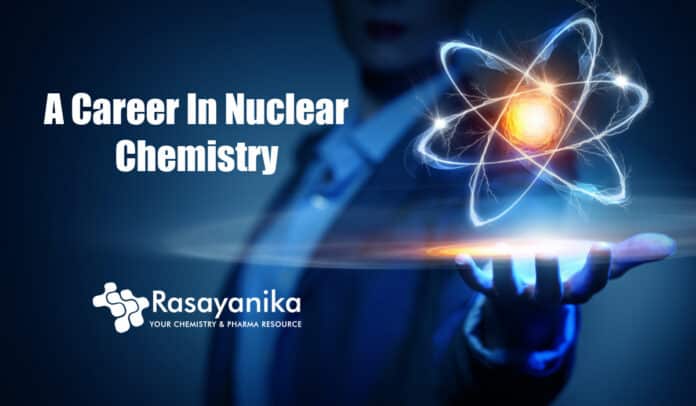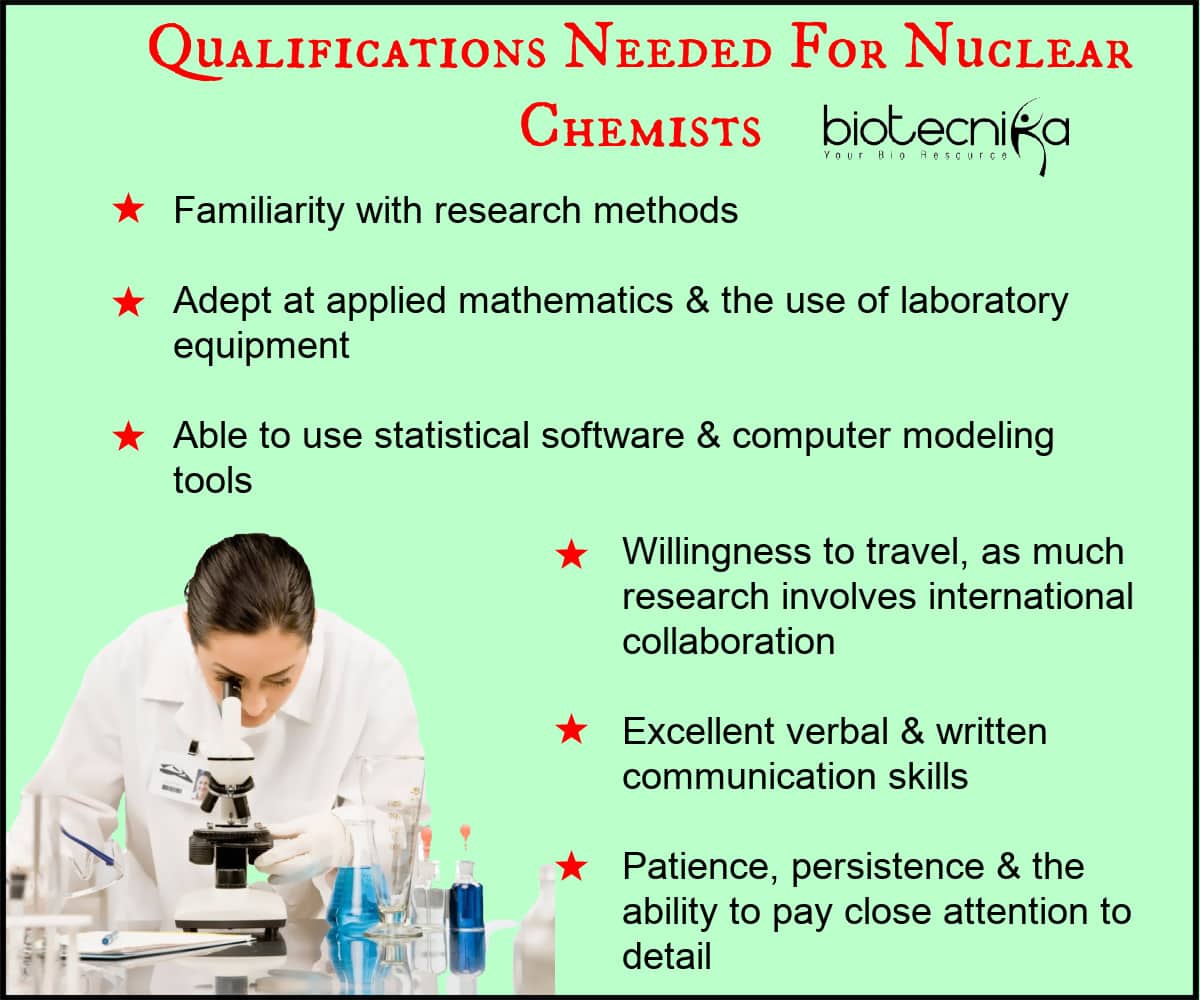Nuclear Chemistry Career Path & Prospects
Nuclear chemistry deals with something that is really powerful and hazardous. Nonetheless, the major benefits that it provides indicate that it is significant to understand its mechanism and application, whilst safeguarding ourselves from its detrimental effects.

Nuclear chemistry is a sub-discipline of chemistry involving nuclear properties, alterations in the atoms’ nuclei like nuclear transmutation, nuclear processes, and radioactivity.
Two major applications of nuclear chemistry are energy production and therapeutics. In the pharmaceutical sector, radioactive substances are employed in simple processes like sterilization of items with irradiation and X-rays. The energy industry is a main player in the nuclear chemistry domain. This sector deals with the spent fuel rod disposal methods, its storage & safe transportation, ways to contain possible accidents and to construct nuclear reactors in such a way that they can manage the ways that the radiation will respond with various materials and surfaces.
Additionally, there are industrial applications for nuclear chemistry like polymer production. Subjecting radioactivity to materials can change its features, therefore additional studies in this particular area of nuclear chemistry are probably going to resume for a period of time.

Even though computer software and hardware have advanced to a point where they do most of the computation, a nuclear chemist should discern the basic concepts in order to do calculations and assure that the results are properly interpreted and meaningful. Nuclear research needs precision and patience.
Nuclear chemists might partner with mathematicians, biologists, physicians, engineers, and physicists. Mostly, they have some level of competence in many domains and team up with international groups on research studies. Individuals with solid experience in nuclear chemistry might have job positions based on their particular field of application-for instance, materials engineers or medical researchers.
Experimental nuclear chemists should be diligent in disposing and managing radioactive substances, and they should make sure that laboratory users and students comply with the established safety norms. They might be asked to control dispensation and surveillance of personal dosimetry equipment in their labs.

Nuclear chemists devote their careers to investigate and study nuclear processes & radioactive materials and explore their potential for addressing global conundrums like waste management of nuclear materials from power stations, and medical treatments.
Nuclear chemists mostly work in one of the two key sectors: energy & medicine.
Within the energy field, nuclear chemists concentrate their efforts on the absorption of fission products, synthesis of uranium & thorium, nuclear fusion, and nuclear fission. This study is crucial in the setting up of safety procedures for nuclear reactor activities, radioactive waste storage solutions, and fuel fabrication processes.
In the medical sector, nuclear chemists carry out studies to understand how radioactive substances modify living organisms and make alterations in their biochemistry. This eventually results in the development of diagnostic techniques and medical treatments like X-ray, brachytherapy, radionuclide therapy, and external beam radiotherapy.
Nuclear chemists majorly dedicate their time in labs, performing research, noting their results, examining the data, and later presenting their inferences to clients in a concise and clear way.
In this manner, nuclear chemists serve as consultants to physicists and engineers who are accountable for developing and designing practical solutions like radioactive dyes, reactors, and silos.
Check Out CSIR NET Chemical Sciences Coaching By Biotecnika

- College Professor: Few nuclear chemists do not want to perform fieldwork but rather prefer to carry out university-level investigations. These adepts look for tenure at colleges that back research in their field of interest. Together with finishing and publish their study in peer-review journals, professors in this sector generally teach classes and guide students at the graduate and undergraduate levels. Additionally, nuclear chemistry professors involve themselves in department activities like student advising and administrative governance. Since these jobs are highly competitive, several candidates have finished post-doctoral studies prior to applying for the position.
- Nuclear Reactions Chemist: Nuclear reactions chemists merge their expertise in radiation chemistry and radiochemistry to understand nuclear reactions like fusion and fission. These professionals explore all elements of the nuclear fuel cycle, including waste disposal, handling used fuel, utilizing fuel in nuclear reactors, ore processing, mining nuclear uranium, and producing fuel. Similar to radiochemists, they expose themselves to hazardous substances and should take necessary safety precautions. Nuclear chemists majoring in nuclear reactions generally work for nuclear power plants, however, may even work for universities.
- Radiation Chemists: Even though works of radiation chemists are similar to that of radiochemists, experiments conducted by radiochemists are devoid of radioactivity. They may work on a study to transform water into hydrogen peroxide and hydrogen gas. These adepts can work for universities, however, may even work for the private sectors, like when they work on means to irradiate foods in order to offer them a longer shelf life.
- Radiochemists: Radiochemistry majored nuclear chemists explore radioactive substances that occur both artificially and naturally. They prefer to isolate the radioactive decay, reactions, and structures of these elements. They may perform controlled studies like studying DNA with radioactive phosphorus-32. Since they work with such harmful materials, radiochemists should be very scrupulous and exacting in their job.

Aspirants need to have a natural aptitude in statistics, biochemistry & chemistry, have a high degree of discipline & mental focus, be detail-oriented. Nuclear chemists must have a strong interest in discerning nuclear processes and radioactive elements.
Since the amount of proficiency needed to achieve this career is significantly great, students who aspire to pursue this career need a considerable degree of dedication to their studies.
Many individuals are attracted to this profession as it enables them to conduct a varied set of tasks and employ different skills when carrying out these tasks like laboratory skills and computer skills. Several nuclear chemists are content in working as a group to aid rectify the extremely serious issues in energy and healthcare.
| Communication Skills | Background Knowledge | Analytical Skills |
| Oral & written communication expertise to share results & explain findings to nonscientists & scientists | Competence to utilize lab equipment | Computer skills like familiarity with statistical analysis & computer modeling |
| Mathematical ability | ||
| Analytical skills & critical thinking to analyze the data collected, troubleshoot processes, and design experiments | ||
| Ability & interest to solve applied & basic research problems and problem-solving skills |

Usually, the educational requirement for a nuclear chemist relies on career goals. The more educated you are, the more job possibilities will be available.
Clearing B.Sc. in chemical engineering, biochemistry, organic chemistry, or chemistry is generally the least qualification required to obtain a first-rung career in nuclear chemistry like a laboratory technician or research assistant. It is prevalent for undergraduates to obtain on-the-job training during the beginning of the job.
If you wish to become a nuclear chemist who guides others in applied research, finished their own research projects, you will probably require to qualify M.Sc. in chemistry or allied disciplines like medical chemistry or biochemistry. Few employers seek post-doctoral candidates in particular disciplines associated with nuclear chemistry for the position of nuclear chemist.
Several aspirants will additionally finish post-doctorate work in a discipline in which they wish to major such as nuclear reactions, radiation chemistry, or radiochemistry.

- Nuclear non-proliferation compliance monitoring
- Weapons stockpile stewardship
- Environmental science
- Theoretical chemistry
- Nuclear medicine physics
- Pharmaceutical research
- Materials science

Nuclear chemists deal with the different isotopic versions of elements to understand fusion and fission processes, or they explore the effects of ionizing radiations on the environment, living organisms, and materials. They might work in labs, or they might perform theoretical work-and mostly they do some of both.
Nuclear chemists mostly work in labs, and they might be accountable for repairing, maintaining, and operating modern instrumentation. They are even accountable for assuring the safe disposal & consumption of samples & other items utilized in the laboratory and handling equipment & sample preparation supplies. Duties might include coaching students and other laboratory facility users and assuring that they comply with safety protocols such as the disposal, monitoring, and use of radioactive substances.
Nuclear chemists might work in government or academic laboratories performing theoretical, applied, or basic research. Additionally, they might work in private sectors, in medical facilities, or at nuclear power plants that provide medical imaging and radiation treatments.
Nuclear chemists within the academic sector mostly teach laboratory courses and advanced chemistry. At national labs, nuclear chemists guide visiting users, maintain laboratory areas & instruments, and conduct their own research.
Nuclear chemists frequently have to travel to particular centers to perform experiments and make presentations for conferences. Few international travels might be needed. Technician in this sector collect samples for environmental testing, measure radiation levels, and monitor equipment.
Common responsibilities of a nuclear chemist are:
- Devise & implement detection methods for tracking the radioactivity in the environment
- Devise therapeutic treatments and medical imaging with radioactive elements, or devise treatments for illnesses and injuries due to exposure to radiation
- Devise nuclear power sources from satellites, submarines, public utilities, and other spacecraft
- Devise methods for dismantling, monitoring, and stimulating nuclear weapons and for checking treaty compliance
- Guide student researchers and teach classes at the university level
- Devise computer simulation and mathematical models of nuclear phenomena
- Perform lab research in academic, government, nonprofit institution, or industrial laboratories
- Assess approaches in which subjecting humans to particular degrees of radiation might treat certain kinds of cancers not yet treatable with common types of radiation therapy
- Offer other researchers with testing information that aids them to discern how to medically treat people who have been subjected to nuclear substances
- Study & evaluate biological absorption of nuclear substances
- Consult with engineers & physicists to perform analysis on radioactive elements and conclude test findings

Nuclear chemists are recruited for all kinds of nuclear research in government, academia, and industry. Institutes that recruit nuclear chemists are given below
- Universities & colleges
- Private quality control, development, and research laboratories
- Product development firms & medical research laboratories
- Energy research laboratories & energy firms
- Government agencies

Requirements for nuclear chemists have surged in the sectors of nuclear energy & nuclear medicine in the government and private domains. Nonetheless, comparatively fewer universities offer specialized programs in radiochemistry/nuclear chemistry or have nuclear chemists in their departments.
Even though the absolute counts are comparatively less, the combination of future retirement and rising demands is anticipated to make more career opportunities for individuals who have graduated with training in nuclear chemistry and have specific education.
Get Latest Updates On Nuclear Chemistry Jobs At Rasayanika
Nuclear Chemistry Career Prospects, Career Opportunities In Nuclear Chemistry, Nuclear Chemistry Career Requirements, Educational Requirement Of Nuclear Chemists, How To Build A Career In Nuclear Chemistry, Nuclear Chemistry Career Prospects, How To Build A Career In Nuclear Chemistry, Educational Requirement Of Nuclear Chemists, How To Build A Career In Nuclear Chemistry, Career Opportunities In Nuclear Chemistry, Educational Requirement Of Nuclear Chemists, Nuclear Chemistry Career Requirements, Nuclear Chemistry Career Prospects, Nuclear Chemistry Career Requirements, How To Build A Career In Nuclear Chemistry, Educational Requirement Of Nuclear Chemists, Nuclear Chemistry Career Requirements, Career Opportunities In Nuclear Chemistry, Nuclear Chemistry Career Prospects, Career Opportunities In Nuclear Chemistry



















































i want to grow carrer in this nuclear chemistry field.